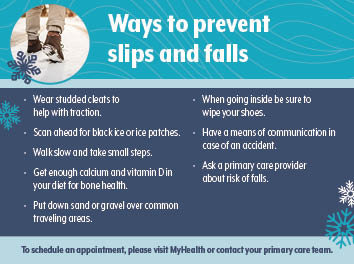Aging Well: Fall Prevention
By Southcentral Foundation Corporate Communications
Nelson enjoys living on his own and being active. However, he has been feeling dizzy lately and had a fall. Nelson shares this information with his primary care provider, and they discuss how the dizziness may be caused by his blood pressure medication. They work together with his integrated care team’s pharmacist to make changes.
Have you had a fall like Nelson? This scenario is fictitious but demonstrates how falls are common enough that it is likely you or a friend or family member have experienced one. However, most falls are preventable. They are not inevitable as we age.
“Yes, the risks increase for falls as we get older, but there are resources and supports available to help you live a life free from falls, and free from the fear of falling,” Anchorage Native Primary Care Center Medical Director Dr. Allison Critchlow said.
Nelson, for example, collaborated with his primary care provider and pharmacist to change his blood pressure medication. He also started seeing a physical therapist who helps increase his strength and balance through exercise. Nelson no longer gets dizzy when he stands up. Now that he is stronger and knows his options, he feels at ease and can continue enjoying his daily activities.
By sharing any concerns with your health care team, you can also find ways to stay strong, improve balance, and support your independence.
Four steps to prevent falls:
Be physically active. Tai Chi? Walking? Gym exercises? Meet with an exercise physiologist (by referral from your provider) and find a favorite way to maintain or increase your strength and balance. Drink water before and after activities to feel less dizzy and less tired.
Care for your eyes and ears. Make it a point, every year, to visit Optometry, for a vision test and Audiology for a hearing test. They can make recommendations, such as new prescription glasses, to reduce your risk of falling.
Make your home safer. Remove hazards, improve lighting, and install non-slip rugs, grab bars, and handrails. Need guidance? Request a referral to Occupational Therapy and they will not only suggest options for a safer living space, but also provide activities to help you stay independent.
Talk with your care team. Your provider can offer personalized steps to reduce your risks, including reviewing your medicines and/or supplements for interactions or side effects.
For more information, visit: southcentralfoundation.com/aging-well.


